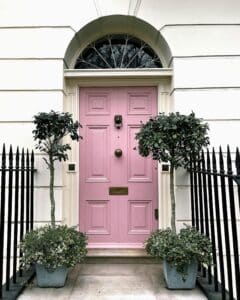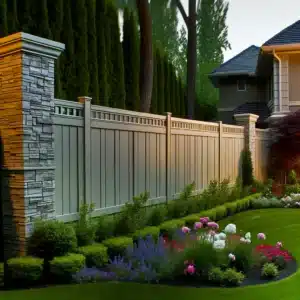At a Glance
- Wood Fencing: A Classic Choice with a Natural Appeal
- Vinyl Fencing: A Modern and Low-Maintenance Alternative
- Chain Link Fencing: The Practical and Economical Choice
- Composite Fencing: The Eco-Friendly and Durable Alternative
- Pros And Cons of Fencing Materials FAQs
As the world becomes increasingly urbanized, the value of personal space and security has risen exponentially. With this trend, fencing has emerged as a popular solution to demarcate boundaries and add an extra layer of protection to homes. But beyond their functional role, fences are also considered an aesthetic element that enhances the curb appeal of properties. They come in different materials, each with its unique set of advantages and drawbacks. This article will delve into the pros and cons of common fencing materials, with a particular focus on how they withstand various weather conditions.
Need help deciding? Try our interactive ‘Fence Materials Quiz‘
Wood Fencing: A Classic Choice with a Natural Appeal
Pros of Wood Fencing
Wood fencing is a timeless choice that exudes a sense of warmth and natural beauty. Its authentic and rustic charm is hard to replicate, making it a favorite amongst homeowners who prefer a classic look. The versatility of wood allows for a wide range of customization options. You can easily tailor its design, size, and color to match the style of your home or personal preference. Whether you want a picket fence for a quaint cottage-style house or a tall privacy fence for your backyard, wood can cater to all types of requirements. Regarding privacy, wood fencing stands out as an excellent option. Its dense composition and the ability to build it to any height make it a strong contender for people seeking solitude in their homes or yards.
Cons of Wood Fencing
Despite its many benefits, wood fencing does require a higher degree of maintenance compared to other materials. It needs regular staining or sealing to maintain its look and prevent damage from moisture and insects. Another downside of wood fencing is its vulnerability to weather-related damages. Wood tends to absorb moisture, which can lead to rotting and warping over time. It’s also susceptible to termite infestation, which can compromise the structural integrity of the fence. Lastly, wood fences do not last as long as their vinyl or metal counterparts. Depending on the type of wood used and how well it’s maintained, a wood fence typically lasts between 10 to 20 years.
Vinyl Fencing: A Modern and Low-Maintenance Alternative
Pros of Vinyl Fencing
Vinyl fencing is a popular modern alternative known for its durability and longevity. It’s made from a type of plastic called polyvinyl chloride (PVC), which is extremely robust and resistant to many common fencing problems. One of the main advantages of vinyl fencing is its low maintenance requirements. Unlike wood, it doesn’t need painting or sealing, making it an attractive option for busy homeowners. All it typically needs is an occasional wash with soap and water to keep it looking new. Vinyl is also impervious to many issues that plague wood fences. It doesn’t rot, warp, or get infested by insects. Plus, it’s waterproof, making it an excellent choice for areas that experience heavy rainfall. Furthermore, vinyl fencing comes in a variety of styles and colors, catering to different aesthetic preferences. Whether you want a white picket fence or a faux-wood grain style, there’s a vinyl fence to suit your taste.
Cons of Vinyl Fencing
While vinyl fencing has many benefits, it’s not without its drawbacks. One of the most notable is its higher upfront cost. Although it may save money in the long run due to its durability and low maintenance, the initial investment is higher than other fencing materials. Another disadvantage of vinyl fencing is its limited customization options. While it comes in various designs and colors, once installed, changes are not easily made. Lastly, despite its resistance to many weather conditions, vinyl can fade or discolor over time, especially under constant exposure to sunlight. However, this issue can be mitigated by opting for higher quality vinyl that’s treated with UV inhibitors to reduce sun damage.
Chain Link Fencing: The Practical and Economical Choice
Pros of Chain Link Fencing
Chain link fencing, also known as wire netting or cyclone fence, is a cost-effective option that offers numerous advantages. Its affordable price point makes it an attractive choice for individuals on a tight budget or those with large areas to cover. In terms of security, chain link fencing excels. The open weave design provides excellent visibility, allowing homeowners to keep an eye on their property and surroundings. This characteristic can be particularly beneficial for properties with swimming pools or play areas where supervision is necessary. One of the significant advantages of chain link fences is their low maintenance requirement. They are made of galvanized steel, which is resistant to weather damages and does not need regular sealing or painting. A simple wash with soap and water is often sufficient to keep it clean and in good condition. Installation of chain link fences is relatively straightforward compared to other types of fences. With the right tools and a basic understanding of its assembly, homeowners may even opt to install it themselves, saving on labor costs.
Cons of Chain Link Fencing
Despite its practicality and affordability, chain link fencing does have its drawbacks. One of the main concerns is its lack of privacy. The open design that provides visibility also means that outsiders can easily see into your property. However, this issue can be mitigated by installing slats or growing a vine or hedge along the fence. Aesthetically, chain link fences may not be the most appealing choice. Compared to wood or vinyl that offer a warm or sophisticated look, chain link fences have a more industrial appearance that may not complement residential landscapes. Finally, due to its aesthetic limitations, chain link fences may not be suitable for all neighborhoods. Some residential areas have regulations on the type of fences allowed, favoring those that enhance the community’s overall appearance.
Composite Fencing: The Eco-Friendly and Durable Alternative
Pros of Composite Fencing
Composite fencing is a modern fencing solution that combines the best of wood and plastic. It offers the natural look of wood but with the durability of synthetic materials. One of the main advantages of composite fencing is its resistance to common fence problems. Unlike wood, it does not rot, warp, or get damaged by insects. This makes it an excellent choice for areas with harsh weather conditions or high insect activity. Maintenance-wise, composite fencing is a low-maintenance option. Like vinyl, it does not require painting or sealing. An occasional clean with soap and water is usually enough to keep it looking fresh and clean. An added advantage of composite fencing is its eco-friendliness. Many composite fences are made from recycled plastics and wood fibers, making them a sustainable choice for environmentally conscious homeowners.
Cons of Composite Fencing
Despite its numerous benefits, composite fencing also has some disadvantages. The most significant being its high initial cost. While it may save money in the long run due to its durability and low maintenance, the upfront investment is higher than other fencing materials such as wood or chain link. Another potential downside of composite fencing is its limited color and style options. While manufacturers strive to offer a variety of designs, the choices are not as extensive as other materials. However, the available options often mimic the natural grain of wood, providing an authentic and attractive look.
Wrought Iron Fencing: Our Best Recommendation
Wrought iron fencing has been used for centuries, adorning properties with its classic and sophisticated look. Its inherent strength, robustness, and durability make it an appealing choice for many homeowners. However, like any other material, it also has its drawbacks.
Pros of Wrought Iron Fencing
Aside from its aesthetic appeal, wrought iron fencing also serves a crucial role in providing security. The formidable strength of this material makes it difficult for intruders to breach, making it a top choice for property owners concerned about security. Moreover, the classic sophistication that wrought iron fencing brings can significantly enhance a property’s curb appeal. The material’s versatility allows for the creation of intricate designs and patterns, offering homeowners the chance to add a touch of elegance and grandeur to their properties.
Furthermore, the design options and customization potential offered by wrought iron fencing are substantial. This versatile material can be fashioned into various styles, from classic Victorian designs to more modern patterns, allowing it to complement any architectural style. Such flexibility allows property owners to create a unique and personalized look for their homes. Lastly, the combination of elegance and durability that wrought iron fencing offers can significantly boost a property’s value, making it a worthwhile investment. Its timeless appeal and enduring quality make it attractive to potential buyers who value both aesthetics and durability.
Cons of Wrought Iron Fencing
Regrettably, the initial investment for wrought iron fencing can be a significant deterrent for some. This is largely due to the cost of the materials and the labor-intensive process required for its installation. Wrought iron is a premium material, and its installation calls for precision and expertise, which naturally incurs higher costs. However, it’s essential to consider this as an investment in the long-term durability and aesthetic appeal of the property. While upfront costs may be substantial, the returns in terms of longevity and increased property value are equally significant.
Despite the robust and resilient nature of wrought iron, it does have its vulnerabilities. Specifically, it is prone to rust, particularly in humid or coastal regions. Prolonged exposure to moisture can trigger rust formation, which if left unattended, can undermine the structural integrity of the fence. This necessitates regular maintenance, including routine inspections for signs of rust. If any are detected, they must be promptly addressed by sanding the affected areas and applying a protective coating to prevent further rusting. While this may seem demanding, the effort is worthwhile to preserve the fence’s strength and appearance.
Lastly, the design of wrought iron fencing may not align with everyone’s preferences or needs. Its open design, while aesthetically pleasing and offering good visibility, does not afford complete privacy. This could be a concern for those seeking a high degree of seclusion for their properties. However, it’s important to remember that the openness of wrought iron fencing can also be seen as a security feature, providing clear sightlines that deter potential intruders. While it may not offer complete visual privacy, it does contribute to a secure and inviting property aesthetic.
In conclusion, choosing the right fencing material for your property involves considering a multitude of factors, including durability, maintenance, cost, and aesthetic appeal. Each material comes with its unique set of advantages and drawbacks. Wood fencing, while aesthetically pleasing and customizable, requires regular upkeep and has a shorter lifespan. In contrast, materials like vinyl and aluminum offer durability and low maintenance but come with a higher initial cost. Chain link fences are cost-effective and easy to maintain but lack in terms of privacy and aesthetics. Composite fencing is environmentally friendly and durable but offers limited customization options. Lastly, wrought iron fencing, while durable and aesthetically appealing, requires a higher initial investment and regular maintenance.
Irish Iron: The Premier Iron Fence Installer in Sacramento
When choosing a fencing material, it’s crucial to consider your specific needs, budget, and aesthetic preferences. The right choice will ultimately depend on finding the balance between functionality, durability, maintenance, and overall appeal. By carefully considering these factors, you can select a fencing material that not only enhances the security and privacy of your property but also adds to its aesthetic charm.
For top-notch iron fencing in Sacramento and the surrounding areas, look no further than Irish Iron. With our unwavering commitment to quality, customer satisfaction, and artistic craftsmanship, we are the perfect choice for homeowners seeking to enhance the aesthetic appeal and security of their property. Don’t hesitate! Reach out to Irish Iron today and elevate your property with the timeless elegance and durability of wrought iron fencing.
Impact of Weather on Fencing FAQs
Which fencing material is the most durable? Materials like steel, aluminum, and vinyl are known for their durability.
Which fencing material requires the least maintenance? Vinyl and aluminum require the least maintenance.
Which fencing material offers the most privacy? Wood and vinyl are excellent choices for privacy fences.
Which fencing material is best for security? Steel and wrought iron are commonly used for security fencing due to their strength.
Can all types of fencing withstand harsh weather conditions? Some materials, like steel, aluminum, and vinyl, are more resistant to harsh weather conditions than others.
Which fencing material is the easiest to install? While it depends on the specific design, vinyl and aluminum fences are often considered easier to install than wood or steel.
How long does a vinyl fence typically last? With proper care, a vinyl fence can last 20 to 30 years.
Is it possible to paint or stain all types of fencing? Wood fences can be painted or stained. Other materials may require special products or techniques.
Which fencing material is best for a home with pets? The choice depends on the pet’s size and behavior. For example, a strong, tall fence may be needed for large dogs.
Which fencing material is best for commercial properties? Durable, low-maintenance materials like steel or aluminum are often preferred for commercial properties.



